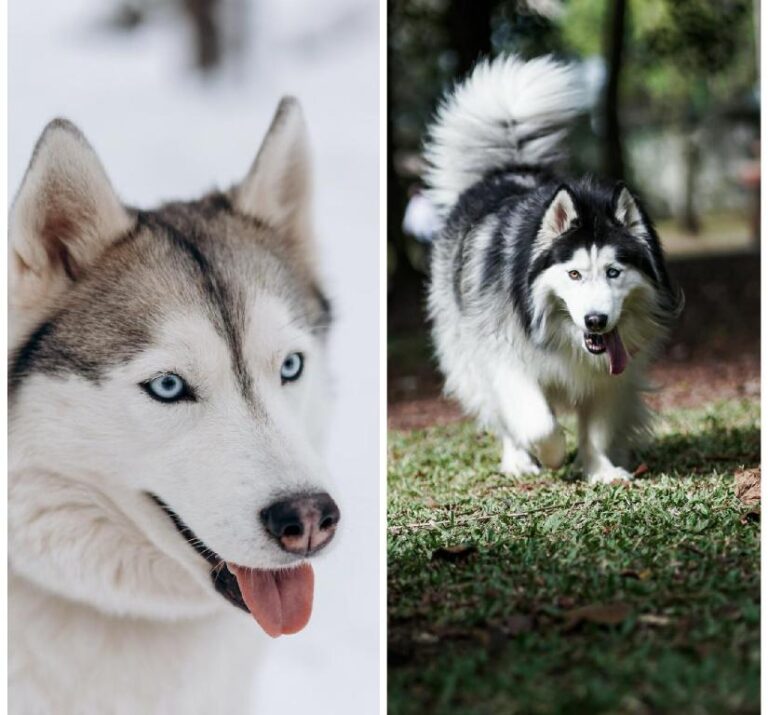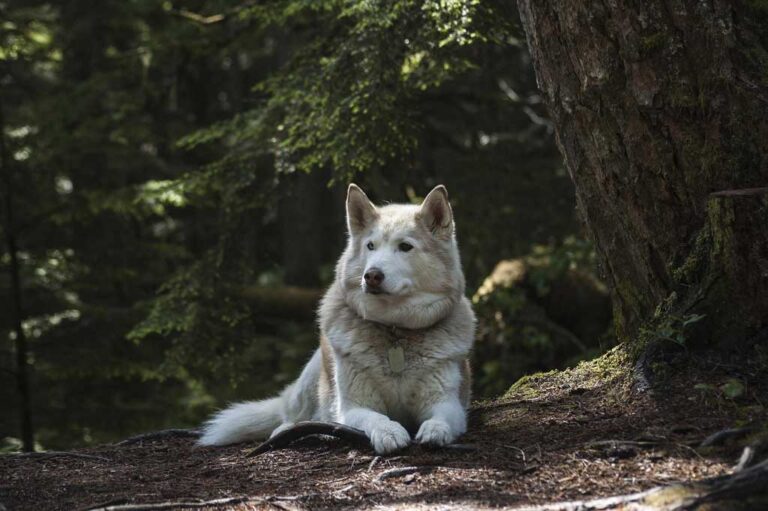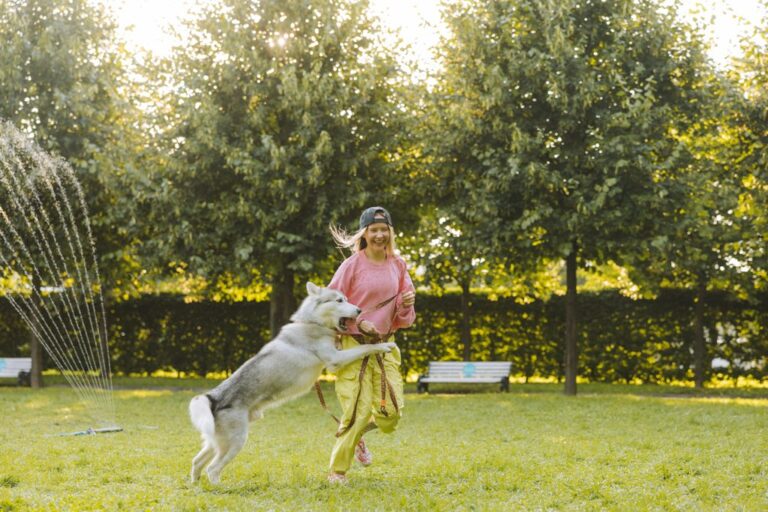Miniature Siberian Husky: 10 Important Facts, Size & Price
Miniature Siberian huskies are small in size with a wolf-like appearance. They are very popular with all dog seekers for their fluffy bodies and attractive, affectionate appearance. The miniature Siberian husky is a very high-energy dog.
Miniature Siberian huskies tend to be considerably shorter and lighter than standard huskies. Although people accept them as companions, they are very temperamental. They certainly require a lot of attention and care. They require focused grooming sessions almost daily. They also need regular physical check-ups at the vet.
To determine if a miniature Siberian husky puppy is a good fit for your home, family, or children’s lifestyle, you need to know everything about them.
Let’s learn about the lovable varieties of miniature Siberian huskies and important facts about their characteristics, behavior, training, exercise, and health.

Origin Of The Miniature Siberian Husky
The Miniature Siberian Husky is a new breed of dog. Bree Normandin was the first to breed this miniature Siberian husky. In the 1990s, he sought to create a companion-sized version of the Standard Siberian Husky by breeding litters of the smallest Siberian Huskies together. And he succeeded in that.
Many breeders are also breeding miniature Siberian huskies using achondroplasia or introducing dwarfism genes. But as a result, they may have some health problems.
However, they are more prone to infections due to their weak immune systems, but they can grow up to be as healthy as their littermates. Breeding them together with proper selection has a higher chance of producing healthy puppies.
Miniature Siberian Husky puppies are members of the Siberian Husky family and are small in size. They are bred for small sizes. They are mainly caused by natural mutations.
However, they are much more active, playful, and outgoing than a typical husky. If you are looking for a small dog with a big personality, the Miniature Siberian Husky may be the right choice for you.
What Does the Miniature Siberian Husky Look Like?
A miniature Siberian husky is a smaller version of a standard Siberian husky. Miniature huskies look like small wolves. This wolf-like appearance makes them look very cute and attractive. They are small in size, have a proud long nose and erect ears, a round but well-proportioned head, and a medium-sized bushy “brush” tail. This breed of dog has a beautiful, medium-length, fluffy coat. However, their main difference is their size. Miniature huskies are much smaller than standard Siberian huskies.
Size And Weight Of Miniature Husky
Miniature Huskies were once the standard size. They have been naturally bred from small huskies for generations to create miniature dog breeds.
At first, miniature huskies were bred by taking the smallest of standard-size huskies and breeding them together. As a result, they give birth to small children.
Thus, the miniature husky dog breed was gradually created by breeding between selected Siberian Huskies. This process began by breeding the smallest pups with other rats, which produced their offspring. Which were considerably smaller than the standard-sized Siberian husky.
Miniature huskies can be about 42% smaller in size than regular-sized huskies. And they can weigh an average of 20 pounds less and be 7 inches shorter than a typical Siberian husky.
Height:
A standard Siberian husky can range in height from about 21 inches to 23.5 inches. That is 53 cm to 60 cm.
But a miniature husky is around 13 to 17 inches tall. That is 33 cm to 43 cm.
Weight:
A standard Siberian husky weighs about 45 to 60 pounds. That is 20 kg to 27 kg.
But a miniature husky weighs between 20 pounds and 35 pounds. That is 09 kg to 15 kg.
Weight of Miniature Husky in Proportion to Age:
Miniature Husky weight changes with age. Weight of a Miniature Husky
5 pounds at 2 months of age,
13 pounds at 4 months of age,
21 pounds at 6 months,
25 pounds at 8 months of age,
and ranges from 25 to 30 pounds at 1 year of age.
Miniature Siberian Husky Personality And Temperament
The personality and temperament of the miniature Siberian husky are similar to those of a standard Siberian husky. Just like a standard Siberian husky, the miniature Siberian husky is very cheerful, loving, playful, and calm. They love to play sports and work. They are bred as companion animals. They are very tolerant of children and love to play with them.
Miniature Huskies are known as working dogs and are very intelligent and hard-working. They always like to run, work, and play sports with family members. So they need a lot of exercise and running.
Miniature Huskies have a strong independent tendency. They are very skilled in the art of escape. So they must be kept in a fenced or enclosed environment.
Miniature Huskies are not aggressive. They are very good-natured, gentle dogs that love human company. They are also friendly with strangers. The miniature Siberian husky is not a guard dog. They are always calm and rarely bark.
Miniature Huskies do not like to be confined. They need an open environment. Where they can run and play spontaneously. They need regular exercise. So if they don’t get these and are left alone in a closed environment, the miniature Siberian husky can be very destructive.
Miniature Husky Health And Lifespan
Although miniature Siberian huskies are small in size, they are beautiful and healthy. They can maintain a healthy weight while consuming less food than their size. Miniature huskies should therefore be fed the right amount of high-quality, protein-based food to keep them healthy, weightless, and free of physical problems.
Like the Standard Siberian Husky, the Miniature Husky is prone to some health problems. Intentionally, some poor breeding of miniature Siberian huskies can lead to various health problems. So they need to be cared for properly with proper vet advice and take proper care of them, always keeping an eye on their health.
Like a standard husky, a miniature Siberian husky has an average lifespan of 12 to 14 years. Although the life expectancy of small dogs is longer than that of their large dog counterparts, miniature huskies are different.
Health Problems Of Miniature Siberian Husky
The life expectancy of a miniature Siberian husky is usually 12 to 14 years on average. However, due to extreme selective breeding, their lifespan may be affected. As a result, they are affected by diseases like eye disease, shortness of breath, dwarfism, intervertebral disc disease, dystocia, etc.
The miniature Siberian husky also suffers from some genetic disorders. For example,
Eye Disorders:
Progressive retinal atrophy is one of the most common health problems in miniature huskies. Progressive retinal atrophy is a hereditary disease of miniature huskies. This disorder can affect your miniature Siberian husky’s eye health and vision. Miniature Huskies are at risk of blindness if this problem goes undetected.
Progressive retinal atrophy is a degenerative disease of the retina of the miniature Siberian Husky eye. It first affects the rod and cone retinal cells in the miniature Siberian husky’s eye and may also erode the pigmented epithelium layer protecting the rod and cone retinal cells. As a result, your miniature Siberian husky may become blind.
This disease will cause your miniature Siberian husky to have trouble seeing in dim light or at night. However, as the rods worsen, daytime blindness may occur. That’s why it’s so important to have your miniature Siberian husky have regular eye exams.
Hypothyroidism:
Hypothyroidism is one of the most dangerous health problems in miniature huskies. Hypothyroidism is usually caused by abnormal secretion of the thyroid gland. This affects your miniature Siberian husky greatly. Symptoms of hypothyroidism include lethargy, loss of appetite, weight gain, cold intolerance, thinning of the hair coat, excessive shedding, dry and dull hair, increased pigmentation of the skin, skin and ear infections, shaving, failure to regrow hair, slow heart rate, etc.
Follicular Dysplasia:
Several types of follicular dysplasia can occur in the miniature Siberian husky. Which can happen at different ages and affect your miniature Siberian husky. It starts slowly in them and may increase or decrease during the first three years of life.
Follicular dysplasia is caused by abnormalities in the hair follicles of miniature huskies. This can result in symptoms such as hair loss, irregular hair growth, and rough skin. Contact your veterinarian immediately if these symptoms occur.
Laryngeal Paralysis:
Laryngeal paralysis is a problem of the larynx in the miniature Siberian husky. This causes respiratory problems in miniature huskies. But it usually develops after the age of 10. This condition develops very slowly. As a result, sufferers usually outgrow it.
Canine hip dysplasia is also another serious and costly disorder. However, miniature huskies are not as affected by this disease as other breeds.
The Right Food For Miniature Siberian Husky
Feeding a miniature Siberian husky is very important, and knowing what type of food you are feeding is very important. Veterinarians recommend feeding miniature huskies a mixture of 80% dry kibble and 20% wet food. A miniature Siberian husky can be fed about 2 cups of high-quality dry kibble per day.
Based on the miniature Siberian husky’s daily calorie intake, aim to feed them 800 to 1,000 calories per day. However, keep in mind that miniature huskies should be fed based on their activity level, weight, age, and breed size.
Miniature Huskies contain the DNA of sled dogs from Siberia, so choose a recipe made for small, active dogs.
Remember not to feed a miniature Siberian husky more than it needs. Which often leads to their obesity. However, their diet and dosage need to be determined in consultation with a good veterinarian.
Does a miniature husky have blue eyes?
Like a typical Siberian husky, the miniature Siberian husky is also a handsome dog with a wolf-like appearance. They have proud noses and erect ears, a round but well-proportioned head, and a short bushy “brush” tail. They also have a beautiful, thick double coat, which, like other double-coated dogs, sheds seasonally.
Miniature Husky’s eyes come in a variety of colors. Sometimes bright blue, sometimes ice blue, sometimes brown, sometimes a mixture of both colors That’s what makes them amazing. But miniature huskies with blue eyes and miniature huskies with ice-blue eyes look the most attractive.
The Exact Breeder Of The Miniature Husky
Buying any “small” dog is very risky. Generally, these “small” dogs are not recognized by the AKC. They are mainly produced and marketed for profit.
But how do you find a good breeder? Those who can show you their correct kennels or breeding stock So beware of breeders who can’t show you both parents of your desired dog breed.
Some breeders will claim that their dogs are purebred. But that is not true. The truth is that they breed them with a different breed. Just like a Pomsky or Pomeranian and Husky mix, for example.
Breeders often lie about the age of their puppies. As a result, miniature huskies often become standard huskies. As a result, many dog owners are deceived. So do a lot of research, find a good breeder, and feel comfortable.
How much does a miniature husky cost?
The Miniature Husky is a relatively new and rare dog breed. They are carefully bred through special methods. So they are very valuable. Many consider the miniature husky a luxury breed. So we don’t have an exact idea about miniature Siberian husky prices.
A miniature husky puppy costs around $1,200 to $2,000. But if they are bred from champion lines, it can cost up to $2,500.
Can the miniature Siberian husky be your best choice?
If you are interested in owning a miniature Siberian husky, consult a good dog breeder about all the pros and cons of the miniature Siberian husky. Research this dog breed thoroughly. Learn all about miniature huskies, and then decide if you are worthy of owning a miniature Siberian husky. Bring the miniature Siberian husky into your home.
The Miniature The Siberian Husky is known to be a hardworking dog. They are very strong, intelligent, and hardworking. They always prefer to work, run, and play sports with their family. A strong independent trend is always seen in them. They are usually not violent. They are very kind and gentle-natured dogs. They love the company of people.
A stubborn attitude is seen in miniature Siberian huskies. They are very active and very good at escaping. However, their advantages outweigh their disadvantages.
The Miniature Siberian Husky is not a breed recognized by the AKC or the Siberian Husky Club of America, Inc. So if you are not interested in attending dog shows, this little husky can be your best choice.
Hi, I’m Piyas! I am a dog lover, trainer & blogger. I am passionate about pet dogs and love to learn and research how to care for, train, and learn all about them.






